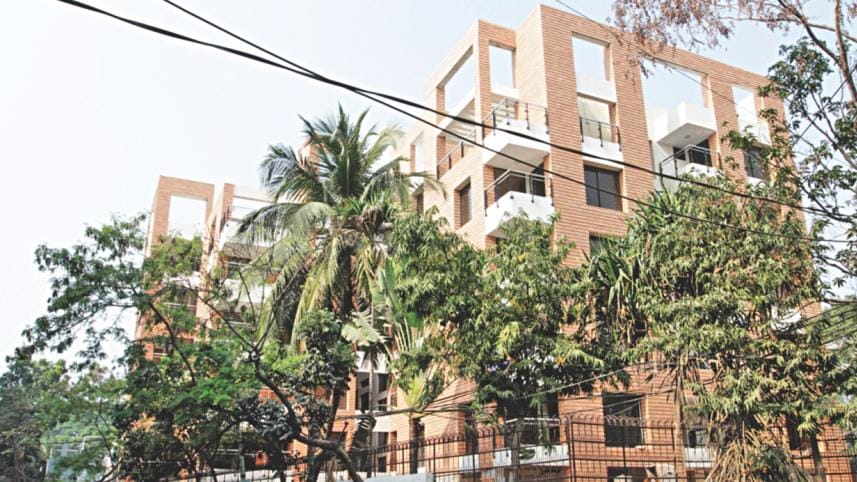A comeback on the horizon for real estate?

Riding on relative political stability and price corrections, Bangladesh's real estate sector may make a comeback this year after three years of bad luck. Since 2012, the once-burgeoning real estate sector has been in difficult times due to the intermittent political instability, squeezing of bank loans, a bearish stock market, and lack of adequate gas and electricity supply. “Developers really had a bad time the last three years. We are yet to make a recovery, but I can see the signs of a comeback,” said Dr. Toufiq M Seraj, Managing Director of Sheltech and former president of REHAB, one of the leading real estate companies of Bangladesh.
With newly found wealth and rising purchasing power, people started to buy plots and apartments in the 2000s, channelling their incomes into the sector. As a result, real estate underwent a boom that reached its peak in 2009-10.
Attracted by the boom, 100 new firms entered the industry and sparked unhealthy competition. Many of these new entrants took up expensive projects, a lot of which were even sold. But the bubble surpassed its sustainable limit, which leads to its inevitable burst come 2012. As a result, sales have dropped by between 30-50% in the last three years. Because of the slowdown, developers have cut down projects and a huge number of apartments have remained unsold.
The number of unsold apartments multiplied by four times, from 3,018 units in 2010 to 12,185 units in 2014, according to the Real Estate & Housing Association of Bangladesh (REHAB), the industry lobby group. At present, the number stands at about 10,000 flats unsold.
The real estate sector remains stagnant although demand is supposed to be on the way up thanks to the rising population of Dhaka city, as well as the rest of the country. As the 11th most populous city in the world, according to a United Nations report published in July 2014, the capital city had a population of 1.7 crore the same year. The World Urbanisation Prospects report of 2014 stated that 2010 to 2015 alone saw a 3.6% annual rise in population in Dhaka. It predicts that Dhaka is set to becoming the world's 6th most crowded city by 2030, with a population just above 2.7 crore.
“We have already had price corrections,” Seraj told The Daily Star in an interview recently, adding that Sheltech itself did not take up any project in 2014-15. As the sector is very big, the recovery will also be slower. “People normally put their entire life's income into property. But they do not want to risk their money when the going is difficult.”
Now that the political tension has somewhat decreased, the interest rate has also gone down and the confidence of the people should begin to make a recovery too. The former president of REHAB is optimistic and said his firm will be taking up new projects. He added that the government should take some policy decisions to revitalise the real estate sector.
One of these policy changes could be that no government agencies will pursue people who are investing their undisclosed money in the sector after fulfilling set conditions. “It should be all-inclusive. Otherwise, people with undisclosed money will not be interested in investing in the real estate sector and will seek ways to transfer their money abroad illegally,” said an owner of a real estate company.

According to a recent report by Global Financial Integrity, a Washington-based research and advisory organisation, illegal capital flight from Bangladesh skyrocketed by 33.78% to USD 9.66 billion in 2013 through trade mis-invoicing and other channels. Realtors agree that the outflow of illicit money could be reduced if the government allows the investment of undisclosed money with an indemnity.
Realtors also agree that the registration fee needs to go down, as the including value-added tax, advanced income tax and stamp duties eat up about 14% of a property's value. This is much greater than in neighbouring countries. The high cost of registration is one of the factors that have made housing loans so unattractive.
The growth of private real estate sector is further hindered by the incredible increase in land prices. In fact, the government has no control over the increase in the price of land. Sadiq Ahmed, Vice Chairman of the Policy Research Institute of Bangladesh, said that between 1972 and 2010, land prices in Dhaka city grew by an average of 100-125% per year.
In spite of the slowdown in business, the real estate sector is moving away from Dhaka to areas such as Chittagong, Sylhet, Rajshahi, Bogra, Comilla, Mymensingh and Khulna. Regional companies are beginning to spring up. Some Dhaka-based firms have also undertaken projects in the regional growth centres. But while, the apartment purchase rate in Dhaka is still the highest in Bangladesh, Chittagong is close behind. Cox's Bazaar's pricing is also starting to increase because of the area's tourism value.
But the list of predicaments goes on. Realtors are opposed to awarding government plots to individuals at a very low price compared to the market rates. They say these individuals in reality give these plots to real estate companies that develop the property and share the apartments with the owners of the land. In the process, customers who buy from the real estate companies have to pay higher prices for the flats. “If the government gives these plots directly to real estate companies at low prices then the developers will also be able to sell the apartments at a much lower price,” said Seraj. He added that in order to avoid controversy, the government can hold auctions for these plots.
The apartment value in Dhaka is also too high for middle class and low-income people, who opt to rent houses instead. Experts say the government needs to grant low-cost loans to help people buy apartments. To this end, the Housing Minister, Mosharraf Hossain, requested the government December last year to create a special fund of BDT 20,000-50,000 crore to provide easy home loans. The fund would be used to provide long-term credit to people at single digit interest rates solely for the purpose of purchasing flats. “They will take out a loan from the fund to buy a home, not to do business. So, they will try their best to repay the loan and the government can be assured that it will get its money back,” he said.
The minister also touched upon the issue of allowing undisclosed money to be invested in the sector. Previously, black money could be invested in the housing sector without any questions. But now, the authorities are allowed to scrutinise the source of funds. The minister encouraged the unbarred investment of undisclosed money and removal of legal complexities plaguing the system. He firmly believes that this facility will not only make the real estate sector more vibrant, but it will also discourage capital flights from the country.
Today, it's not only about unsold flats. Up to 300 sub-sectors now depend on the real estate sector. According to REHAB, which has more than 1,130 real estate companies as members, real estate and linked industries contributed about 12% to the country's GDP in 2014, employing a 3.5 million both directly and indirectly. Thus, the real estate sector must be protected in order to keep the 300 sub-sectors and the 3.5 million people alive.
The writer is a senior staff reporter for The Daily Star.




 For all latest news, follow The Daily Star's Google News channel.
For all latest news, follow The Daily Star's Google News channel.
Comments